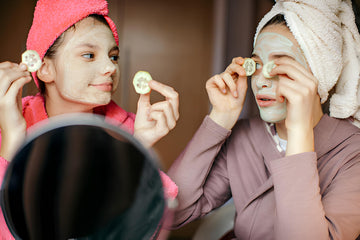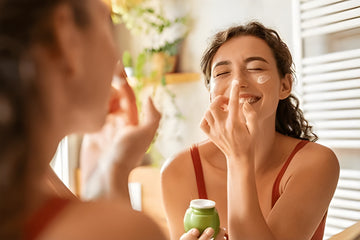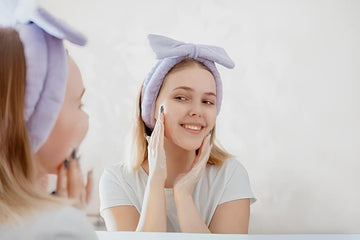In the ever-evolving world of skincare, the specific needs of teenage skin often get overshadowed. As a parent or a teen, understanding why skincare formulated for adolescents is not just a marketing gimmick but a necessity can be a game-changer for your teenager’s skin's health. Let's delve into why teen-specific skincare is crucial and how it makes a real difference.
Understanding Teenage Skin: More Than Just Hormonal Changes
Teenage skin is a complex landscape, significantly influenced by hormonal fluctuations. These changes can lead to common issues like acne, oiliness, and increased sensitivity. Unlike adult skin, which may require anti-aging or intense moisturising products, teenage skin needs gentle, yet effective solutions. This is where teen-specific skincare comes into play, offering formulations that directly address these unique concerns.
The Teen Skin Barrier: Delicate Yet Determined
Think of the skin barrier as a protective wall: its lipids hold the fort, keeping the bad elements out and the good stuff in. While robust in its defence, teen skin is also quite thin and, therefore, more susceptible to damage. That’s why incorporating harsh ingredients such as AHAs, retinol, and vitamin C into a teen's routine is often discouraged. These powerful actives can irritate the skin, lead to sun sensitivity, and in some cases, exacerbate conditions like acne and eczema. Moreover, they may deplete natural ceramides, leaving the skin barrier compromised and vulnerable.
The Risks of Adult Skincare on Teen Skin
When teenagers use skincare products designed for adults, they may inadvertently expose their skin to risks that can have both immediate and long-term consequences. Here's a deeper look into why adult skincare products are not always suitable for adolescent skin:
Stronger Active Ingredients: Adult skincare products often contain higher concentrations of active ingredients, like retinoids, vitamin C or essential oils. While these are effective for anti-aging and deep hydration in adult skin, they can be too potent for younger skin, potentially leading to irritation, dryness, or exacerbating acne problems.
Different Skin Concerns: The primary concerns of adult skin – such as wrinkles, sun damage, and loss of elasticity – are vastly different from teenage skin concerns like acne and oil control. Products designed for adults might not address the specific needs of teen skin, or worse, could aggravate teenage skin issues.
Increased Sensitivity and Irritation: Teenage skin is generally more sensitive and reactive than mature skin. The use of adult skincare products, especially those with essential oils, alcohol, and harsh exfoliants, can cause redness, irritation, and discomfort. This is particularly true for teens with conditions like eczema or rosacea.
Over-drying and Stripping Natural Oils: Many adult skincare products are formulated to combat signs of aging, often by providing intense moisture or exfoliation. For teen skin, which tends to be more naturally oily, these products can strip away essential oils, disrupting the skin’s natural balance and leading to either increased oil production or excessive dryness.
Long-Term Skin Damage: Repeated use of unsuitable adult skincare products during teenage years can potentially lead to long-term skin damage. This includes premature aging signs, increased sensitivity, and weakened skin barrier function.
Hormonal Imbalance Considerations: Teen skin is undergoing changes due to hormonal fluctuations. Adult skincare products are not formulated to address these specific hormonal influences, which can be crucial in managing teenage skin problems effectively
For above reasons, it's vital that teenagers use products formulated for their specific skin needs. Teen skincare products are typically designed to be gentle yet effective, focusing on balancing the skin, providing proper hydration, and tackling common issues like acne without causing harm. Guiding teenagers towards the right skincare choices not only ensures the health of their skin today but also sets the foundation for a lifetime of healthy skin care practices.
A Balanced Approach to Acne and Oil Control
When it comes to managing acne, salicylic acid is the go-to recommendation. It’s effective yet gentle when used in proper concentrations. Starting low and going slow is the mantra here, as it helps minimize potential side effects like dryness and irritation. For regulating oil production and improving skin tone, niacinamide is a star player, known for its balancing act and ability to fade discoloration.
The Core of a Teen Skin Care Routine
The foundation of teen skin care should be straightforward: support the skin barrier and shield the skin from environmental aggressors like UV rays and pollution. This translates to using a gentle non-soap cleanser twice daily, followed by an oil-free moisturizer, and not forgetting a morning application of SPF 30 or higher. Night-time care focuses on reinforcing the skin barrier with a nourishing moisturizer.
Conclusion
The intersection of teenage skin and harmful chemicals in skincare is a concern that should not be overlooked. The developing nature of teenage skin means it requires gentle, safe products free from harsh chemicals. By prioritizing safe teenage skincare, we can help ensure that teens not only look their best but also lay the foundation for healthy skin well into adulthood.





